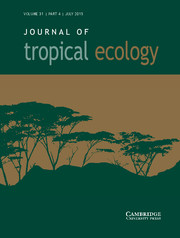Article contents
Biogeographic and fragmentation-related research biases on antbirds and non-flying small mammals in Brazil
Published online by Cambridge University Press: 30 July 2021
Abstract
Major biogeographic and taxonomic biases are recurrent in biological surveys, including fragmentation studies. Detecting biases and subsequent gaps is crucial to steer future research and suitable conservation policies. We evaluated biogeographic and fragmentation-related biases on antbirds and non-flying small mammals in Brazil, two oversampled and vulnerable taxonomic groups, by surveying papers in the Scielo and the Web of Science. We found 566 articles published from 1945 to 2018, including 55 and 43 fragmentation studies for antbirds and small mammals, respectively. Considering the species richness for each group across the Brazilian biomes, the number of publications for small mammals tended to disproportionately increase while increasing richness. The Atlantic Forest, the most degraded and densely populated biome, contained the highest number of publications. However, the Amazon included a disproportionately high number of papers considering its low population density. Conversely, non-forest biomes such as the Caatinga, Pampa and Pantanal were mostly overlooked. Our results show that research effort for small mammals and antbirds in Brazil is biogeographically biased. We call future research to consider more studies across non-forest biomes and vast unexplored areas within forest biomes to overcome major knowledge gaps on diversity, distribution and ecology of antbirds and small mammals in Brazil.
- Type
- Research Article
- Information
- Copyright
- © The Author(s), 2021. Published by Cambridge University Press
References
- 1
- Cited by


